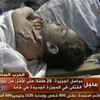
Responsibility for the Israeli airstrikes that killed at least 54 civilians sheltering in a home in the Lebanese village of Qana rests squarely with the Israeli military, Human Rights Watch said today. It is the latest product of an indiscriminate bombing campaign that the Israel Defense Forces (IDF) have waged in Lebanon over the past 18 days, leaving an estimated 750 people dead, the vast majority of them civilians. “Today’s strike on Qana, killing at least 54 civilians, more than half of them children, suggests that the Israeli military is treating southern Lebanon as a free-fire zone,” said HRW’s Kenneth Roth. Read more about Israel Responsible for Qana Attack: Indiscriminate Bombing in Lebanon a War Crime
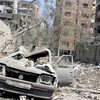
The close and extensive military relationship between the United States and Israel gives the United States a special responsibility to raise civilian protection issues with Israeli leaders with regard to the Israeli military campaigns in Lebanon and Gaza, and to ensure that U.S.-supplied weapons are not used in attacks that violate international humanitarian law. The United States’ commitment to fighting terrorism in the region also strongly argues for raising these concerns with Israel, since that fight is undermined if a close U.S. ally launches attacks that fail to distinguish between combatants and civilians. Read more about Letter to Secretary of State Condoleeza Rice on the Crisis in Lebanon
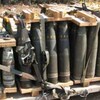
Israel has used artillery-fired cluster munitions in populated areas of Lebanon, Human Rights Watch said today. Researchers on the ground in Lebanon confirmed that a cluster munitions attack on the village of Blida on July 19 killed one and wounded at least 12 civilians, including seven children. Human Rights Watch researchers also photographed cluster munitions in the arsenal of Israeli artillery teams on the Israel-Lebanon border. “Cluster munitions are unacceptably inaccurate and unreliable weapons when used around civilians,” said Kenneth Roth, executive director of Human Rights Watch. “They should never be used in populated areas.” Read more about Israeli Cluster Munitions Hit Civilians in Lebanon
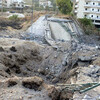
Warnings by the Israel Defense Forces (IDF) to civilians that they must evacuate southern Lebanon within 24 hours do not absolve Israel of the duty to avoid attacks likely to cause indiscriminate or disproportionate loss of civilian life. Yesterday, the IDF advised all civilians south of the Litani River in southern Lebanon to evacuate the region within 24 hours for their own safety. Through leaflets dropped by aircraft, radio broadcasts and a recorded message to mobile phones, residents were advised not to travel on motorcycles or in vans or trucks lest they be “suspected of transporting weapons and rockets,” and become “a potential target.” Read more about Israel must allow civilians safe passage
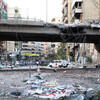
In one incident on Monday, Israeli missiles struck a convoy of trucks from the United Arab Emirates near the town of Zahleh as it approached Beirut from Syria, damaging or destroying three of the trucks, as well as four passenger vehicles. Washington Post and Agence France-Press reporters at the scene wrote that the trucks contained supplies of medicines, vegetable oil, sugar and rice. The Red Crescent Society of the United Arab Emirates (UAE RC) said in a statement that the convoy contained medical supplies and medicines, as well as several ambulances. Read more about Israel must provide safe passage to relief convoys

Hezbollah’s attacks in Israel on Sunday and Monday were at best indiscriminate attacks in civilian areas, at worst the deliberate targeting of civilians. Either way, they were serious violations of international humanitarian law and probable war crimes, Human Rights Watch said today. In addition, the warheads used suggest a desire to maximize harm to civilians. Some of the rockets launched against Haifa over the past two days contained hundreds of metal ball bearings that are of limited use against military targets but cause great harm to civilians and civilian property. Read more about HRW: Hezbollah rocket attacks on Haifa designed to kill civilians
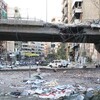
On Saturday, a number of families fled the southern Lebanese village of Marwahin after the Israel Defense Forces (IDF) warned them to evacuate ahead of a threatened attack. On the road leading to the coast through Chamaa, however, Israeli missiles struck a convoy of the civilians. Maps of southern Lebanon show this road to be the only direct route for escaping the dangerous border area. A photographer for an international news agency who arrived at the scene two hours after the attack told Human Rights Watch that he saw a white van and a passenger car completely destroyed. He counted 16 dead bodies. Read more about Israel: Investigate attack on civilians in Lebanon
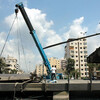
The following questions and answers set out some of the legal rules governing the various actions taken by Israel and Hezbollah to date in this recent conflict. Human Rights Watch sets out these rules before it has been able to conduct extensive on-the-ground investigation. The purpose is to provide analytic guidance for those who are examining the fighting as well as for the parties to the conflict and those with the capacity to influence them. This Q & A addresses only the rules of international humanitarian law, known as jus in bello, which govern the way each party to the armed conflict must conduct itself in the course of the hostilities. Read more about Questions and answers on hostilities between Israel and Hezbollah
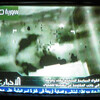
Hizballah and Israel must not under any circumstances attack civilians in Israel and Lebanon, Human Rights Watch said today. Human Rights Watch called on all sides to scrupulously respect the absolute prohibition against targeting civilians or carrying out attacks that indiscriminately harm civilians. “Hizballah and Israel must make protecting civilians the priority, and direct attacks only at military targets,” said Joe Stork, deputy director of the Middle East and North Africa division at Human Rights Watch. Human Rights Watch said that attacks on civilians, or acts to intimidate civilians, clearly violate international humanitarian law, and may constitute war crimes, even if carried out in reprisal for attacks by an adversary on one’s own civilians. Read more about Human Rights Watch: "Do Not Attack Civilians"
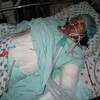
Israel should immediately launch an independent, impartial investigation of a June 9 Israeli artillery strike on a beach north of Gaza City, Human Rights Watch said today. Seven Palestinian civilians picnicking on the beach were killed that day and dozens of others were wounded. Human Rights Watch researchers have visited the site to examine the fatal crater and have interviewed victims, witnesses, security and medical staff. “There has been much speculation about the cause of the beach killings, but the evidence we have gathered strongly suggests Israeli artillery fire was to blame,” said Sarah Leah Whitson, director of the Middle East and Africa division at Human Rights Watch. Read more about Human Rights Watch: Artillery Strike Probably Killed Palestinian Family









